动词和动词词组
动词和动词短语

动词和动词短语1.接不定式(不接动名词>作宾语的24个常用动词afford(买得起;有能力做>,agree(同意>,arrange(安排>,ask(要求;让>,beg(请求>,fail(失败>,choose(选择>,decide(决定>,demand(要求>,determine(决定>,expect(期待>,fear(害怕>,help(帮助>,hope(希望>,learn(学习>,manage(设法>,offer(提出>,plan(计划>,prepare(准备>,pretend(假装>,promise(许诺>,refuse(拒绝>,want(想要>,wish(希望>NqFaLH4sHkIt is a very important exam so I can’t afford to fail it.NqFaLH4sHk这是非常重要的考试,我不可以失败。
My neighbour offered to help me when I was in trouble.NqFaLH4sHk当我困难时,邻居主动提出帮我忙。
2.接动名词(不接不定式>作宾语的28个常用动词admit(承认>,advise(建议>,allow(允许>,appreciate(感激>,avoid(避免>,consider(考虑>,delay(推迟>,deny(否认>,dislike(不喜欢>,enjoy(喜欢>,escape(逃避>,fancy(想象>,finish(完成>,forbid(禁止>,stand(忍受>,imagine(想象>,keep(继续>,mention(提到>,mind(介意>,miss(错过>,permit(允许>,practise(练习>,prohibit(禁止>,report(报道>,risk(冒险>,stop(停止>,suggest(建议>,understand(理解>NqFaLH4sHkI really appreciate working with someone who does such a good job.NqFaLH4sHk我非常乐意与工作如此出色的人共事。
高考常见的动词词组动词词组

1. 动词+aboutcare about 对…在乎come about 发生(vi)bring about 引起,使发生hear about 听说set about doing 着手,开始做think about 思考worry about 为…担心2. 动词+ ataim at 目的是call at 拜访(地点)come atglance at 匆匆一瞥glare at 怒视laugh at 嘲笑knock at 敲(门,窗)point at 指向run at 冲向shoot at 向…射击shout at 冲某人嚷嚷smile at 冲某人微笑stare at 凝视tear at 用力撕wonder at 惊讶work at3. 动词+awayblow away 吹走carry away 拿走,使入迷clear away 消除掉,消散give away 背弃,泄漏pass away 过世put away 收拾起来;存起来take away 拿走throw away 扔掉wash away 冲走4. 动词+backcall back 回电话give back 归还hold back 控制住;踌躇;阻止…发展keep back 隐瞒;忍住;扣下(钱)look back 回顾take back 拿回,收回5. 动词+downbreak down 坏了;垮了;失灵;分解;克服(某种情绪)bring down 使…降低;使...倒下burn down 烧毁come down 下落,传下来calm down 平静下来cut down 消减;坎倒pass down 传下来settle down 安家;安静下来slow down 慢下来take down 记下tear down 拆毁,拆除turn down 调小,拒绝6. 动词+foranswer for 对…负责apply for 申请ask for 要求得到beg for 乞求call for 要求;需要change…for…用…来换charge …for…收费;要价care for 关心;喜欢hunt for 寻找hope/ wish for 希望long for 渴望look for 寻找pay for 为…付钱run for 竞选search for 查找stand for 代表,表示take… for 误以为…是…wait for 等待7. 动词+fromdate from 始于…(=date back to)differ from 与…不同die from 因…而死hear from 收到某人来信keep/ prevent/ stop …from doing阻止learn from 向…学习result from 由于separate… from 把…分离开suffer from 受…苦8. 动词+inbreak in 强行进入;插话bring in 引进;赚得call in 召集;来访cut in 插入drop in 拜访fill in 填写get in 进入;收获give in 让步,投降hand in 上交join in 参加(活动)look in 来访,参观persist in 坚持result in 导致succeed in 成功take in 吸收;理解;欺骗9. 动词+intoburst into 闯入;迸发change ….into…把…变成…divide…into…把…分成…look into 研究;调查put/ translate…into…翻译run into 碰到turn into 变成10. 动词+ofapprove of 赞成complaim of 抱怨consist of 组成die of 死于dream of 梦到hear of 听说rob sb. of 抢劫某人某物speak of 谈到talk of 谈到think of 想到11. 动词+offbreak off 打断carry off 带走cut off 切断;断绝fall off 跌落,掉下get off 脱下;下车give off 散发出go off 走开,消失,坏掉keep off 避开;勿走进knock off 把…撞落leave off 中断,停下pay off 还清put off 延期,推迟see off 送行set off 出发,上路show off 炫耀start off 出发take off 脱下;起飞;腾飞;模仿turn off 关掉;turn sb off 使某人厌烦12. 动词+onbring on 使…发展carry on 继续,进行call on 拜访call on sb to do 号召某人去做congratulation to sb on sth祝贺depend on 依靠feed on 以…为生go on 继续,进行insist on 坚持have on 穿着keep on 继续look on 旁观live on 以…为生move on 继续移动,向前走operate on 给…做手术pass on 传受,传递put on 穿上,戴上,上演rely on 依靠spend…on sth/ in doing 在某方面花钱take on 雇佣;呈现;承担(任务)try on 试穿turn/ switch on 打开work on 从事13. 动词+outbreak out 爆发bring out 阐明burst out 迸发carry out 执行come out 出来;出版;开花drop out 辍学;退出figure out 算出find out 查处give out 散发;分发;用完;劳累go out 熄灭hand out 散发help out 救助hold out 伸出;坚持下去leave out 省略,删掉let out 泄漏,发出(声音)look out 小心keep out 使…不进入make out 理解,看清楚pick out 选出point out 指出put out 扑灭run out 被用完run out of 把…用完set out 出发;开始做to dosend out 发出;派遣speak out 大胆讲出try out 使用,试验turn out 结果是;生产wear out 突破;使…疲劳work out 算出;制定;运行结果;锻炼14. 动词+overget over 克服;恢复go over 复习;审查,研究fall over 跌倒,摔倒look over 翻阅;检查roll over 翻滚run over 看一遍,压死take over 接管think over 仔细考虑turn over 翻倒;细想15. 动词+toadd to 增添add….to…把…增添到…agree to 同意attend to 照料belong to 属于come to 共计;苏醒compare …to…与…相比devote to 致力于get to 到达happen to 发生lead to 导致listen to 听object to 反对point to 指向refer to 谈到;涉及到;参阅reply to 答复see to 处理,照料stick/ hold/ keep to 坚持supply… to 为..提供turn to 查阅;向…求助write to 给某人写信16. 动词+upbreak up 分解,解散bring up 抚养build up 建立catch up with 赶上clear up 整理,收拾;放晴come up 上来;出现cut up 切碎do up 整理,包装eat up 吃完end up 结束fix up 修理;安排,装置get up 起床,站起give up 放弃,停止go up 增长,上涨grow up 成长hurry up 赶快keep up 保持hold up 耽搁,使停顿lay up 积蓄look up 查找,找出make up 组成;编造;铺(床);和好open up 开创pick up 拾起;学会;接某人;接受put up 搭起;住宿;张贴ring up 打电话send up 发射set up 架起;建立sit up 熬夜speed up 加速stay up 熬夜take up 开始做;从事;继续;占据tear up 撕碎throw up 吐turn up 调大;出席,出现use up用完17. 动词+withagree with同意begin with以…开始combine with结合compare…with…对比cover with覆盖deal with处理do with处理end with以…结束equip …with…装备fill with装满play with玩耍provide sb with sth提供provide sth for sb meet with遇到,遭受share with分享supply sb with sth提供supply sth to sb talk with和某人谈话18. 动词+throughget through通过;完成;接通电话go through审查,检查live through经历look through翻阅,仔细察看pull through渡过危机see through识破动词+名次+介词catch sight of 瞧见,看见catch/ take hold of 抓住devote oneself to 致力于do harm to 对…有危害do wrong to 冤枉,委屈feel/ have/ take pity for 同情fix one’s eyes on 凝视form the habit of 养成习惯get in touch of 联系上get rid of 去除give advice on 提出建议have trust in 相信have (no)difficulty in (没)有困难have a word with 同某人谈话have words with 和某人争吵have a look at 看have/ show/ feel/ (an)interest in对某物感兴趣have effect on 对…有影响have mercy on 同情怜悯have the honor of 有…的荣幸help oneself to自便keep in touch with 保持联系make friends with 交朋友make fun of 取笑make good/ full use of 利用make (the) best use of 充分利用make an apology to 道歉make a fool of 愚弄make one’s way to 走向make preparations for 为.. 做准备make room for 为…留地方pay a visit to 访问pay attention to 注意put one’s heart to 全神贯注于set fire to=set sth on fire 点火show respect for 尊敬say hello/ goodbye to 打招呼/道别set an example to 树立榜样shake hands with 握手take aim at 瞄准take charge of 负责管理take the side of 支持take pride in 因…而自豪take part in 参加take a photo of 照相take a message for 捎个口信take care of照顾take notice of注意take the place of代替throw light on 阐明动词+副词/形容词+介词add up to 总计为break away from 脱离,挣脱be up to 应由…轮到…cut down on 消减catch up with 赶上come up to 达到(标准)come up against 遭到(反对,困难)do well in 做得好do away with 废除drop in on/ at 拜访人/地face up to 面对,承担fit in with 适合,符合get down to 开始认真做get close to 接近get into the habit of养成习惯get used to 习惯get on/ along with 进展,相处get out of 从…出来,摆脱go on with 继续go back on 背信,背弃go in for 参加,爱好keep away from 远离keep up with 跟上live up to 不辜负look/ watch out for 小心look back upon 回顾look forward to 期待look up to 尊敬look down upon 轻视make up for 弥补put up with 忍受think highly of 高度评价work hard at 努力于动词+介词+名词arrive at/ come to aconclusion得出结论burst into pieces 成为碎片burst into laughter/ tears 突然大笑/大哭come into use 开始使用come into power 当权coem into being 产生do up one’s hair 梳理头发get in a word 插话make up one’s mind 下决心。
动词和动词词组

知识结构网状态:b e持续:keep, last ,remain ,stay, lie,stand似乎:seem,appear感官:look,smell,taste,feel,sound系动词变成:become,grow,go,get,turn,come,fall,run证明:prove,turn out1帮助现在分词构成现在进行时2帮助过去分词构成被动语态Be 3帮助不定式构成beto do结构,表示将来,命令,征求意见,约定等。
1帮助实义动词构成疑问句,否定句助动词 do 2帮助实义动词原型构成强调式3用来代替动词按用法 have帮助过去分词构成完成时态分shall/will/would/should帮助谓语动词构成将来时态宾语及物动词双宾语复合宾语实义动词不及物动词动词情态动词延续性动词:last;keep按意义分动词和非延续性动词:die,leave,come动词词组动词+介词:look at; take on动词+副词:find out ,turn up动词词组动词+副词+介词:come up with, go in for动词+名词+介词:take part in ,take care ofBe+形容词+介词:be ready for ,be devoted to 考点一:动词及动词辨析1,achieve,gain,win,earn(1),achieve,vt. 强调通过极大努力获得或达到某事物,实现弯沉,常与一些抽象名词连用,如:success,goal(2),gain vt 指获得,赢得(尤指想要的或所需的事物)。
此外,gain 还有增加的意思 I gained the impression that the matter had been settled The plane rapidly gained height. Gain weight= put on weight(3),win vt 表示在较强的竞争中取得胜利,它通常跟的宾语有game,war ,prize, fame, battle(4),earn vt. 表示挣钱,赚工资,因自己成就行为等,得到应得的事物,博得,earn one’s living 谋生2,adapt, adjust, adopt(1),adapt 使适合,使适应 adapt (oneself)to …使自己适应。
高考复习动词和动词短语

A your cell phone when 8. Terry, please _____ Grandma is talking to you. (安徽2014) A. look up from B. look into C. look back on D. look through 9. Shakespeare’s writing is still popular B the test of today. It has really _____ time. (安徽2014) A. failed B. stood C. taken D. conducted
2. 动词短语辨析。主要包括同根动词短语 的辨析、同根介词或副词的动词短语的 辨析、 不同动词构成的动词短语的辨析 以及“动词+副词+介词”短语的辨析。 在动词词组的测试中,绝大多数为基础 动词,出现频率较高的词有:get, turn, make, put, go, give, break, cut, come, look, keep, bring, show, pick, hold, fall, carry, pull, catch, call, take等。
4. As a grassroots singer, she reads everything she can _____ B concerning music, and takes every opportunity to improve herself. (福建2014) A. catch sight of B. get hold of C. take charge of D. make mention of
Ralph W. Emerson would always _____ D new ideas that occurred to him. (陕西2014) A. set off B. set about C. set up D. set down
高中英语语法-动词及动词词组
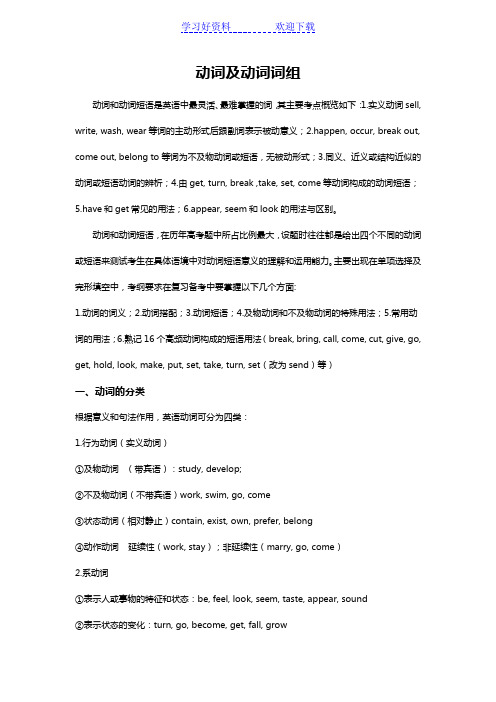
动词及动词词组动词和动词短语是英语中最灵活、最难掌握的词,其主要考点概览如下:1.实义动词sell, write, wash, wear等词的主动形式后跟副词表示被动意义;2.happen, occur, break out, come out, belong to等词为不及物动词或短语,无被动形式;3.同义、近义或结构近似的动词或短语动词的辨析;4.由get, turn, break ,take, set, come等动词构成的动词短语;5.have和get常见的用法;6.appear, seem和look的用法与区别。
动词和动词短语,在历年高考题中所占比例最大,设题时往往都是给出四个不同的动词或短语来测试考生在具体语境中对动词短语意义的理解和运用能力。
主要出现在单项选择及完形填空中,考纲要求在复习备考中要掌握以下几个方面:1.动词的词义;2.动词搭配;3.动词短语;4.及物动词和不及物动词的特殊用法;5.常用动词的用法;6.熟记16个高频动词构成的短语用法(break, bring, call, come, cut, give, go, get, hold, look, make, put, set, take, turn, set(改为send)等)一、动词的分类根据意义和句法作用,英语动词可分为四类:1.行为动词(实义动词)①及物动词(带宾语):study, develop;②不及物动词(不带宾语)work, swim, go, come③状态动词(相对静止)contain, exist, own, prefer, belong④动作动词延续性(work, stay);非延续性(marry, go, come)2.系动词①表示人或事物的特征和状态:be, feel, look, seem, taste, appear, sound②表示状态的变化:turn, go, become, get, fall, grow③表示某种状态的延续或持续:remain, keep, stay3.助动词(与动词原形或分词构成复合谓语):be(am,is,are),do(does,did);have(has);will,would,shall4.情态动词:can(could),may(might),must,shall(should)二、动词及动词短语(一)动词词义辨析动词是是各类考试的重点,高考试题中,单项填空、完形填空和改错等三项题型中,动词辨义的比重较大,并逐年增加。
中学历史常见动词及动词词组

中学历史常见动词及动词词组
本文档旨在介绍中学历史学科中常见的动词及动词词组,供学生们参考和研究。
1. 描述历史事件和过程的动词:
- 发生:某事件在某时间和地点发生。
例:法国大革命发生在1789年。
- 影响:某事件对其他事物产生作用。
例:工业革命对社会经济产生了深远的影响。
- 引起:某事件导致了其他后续事件的发生。
例:第一次世界大战引起了第二次世界大战的爆发。
2. 分析历史原因和结果的动词词组:
- 导致:某个因素导致了特定的结果。
例:经济不景气导致了社会不满情绪的增加。
- 因此/因此而:表示由于某个因素,产生了特定的结果。
例:工商业的发展带动了城市人口的增长,因此而出现了城市化现象。
- 带来:某个因素带来了某些后果。
例:环境污染带来了严重的生态问题。
3. 表达历史观点和评价的动词词组:
- 认为:表示个人或学者对某个历史事件或问题的看法。
例:历史学家认为罗马帝国的衰败有许多原因。
- 强调:对某个观点或事实进行特别的强调。
例:我们应该强调文化因素在历史发展中的重要性。
- 反映:某个事物或现象反映出特定的历史背景或状态。
例:古代建筑反映了当时的社会文化水平。
请注意,以上只是一些中学历史中常见的动词及动词词组,不包括全部内容。
在写作时,可以根据具体的历史事件和要表达的观点选择适当的动词表达。
动词和动词词组 ppt课件

My wife doesn’t know Russian
Do you agree with me?
2.do用来加强语气,起强调作用 You do look well
3.do用作代词 ---Do you like Beijing? ---Yes,I do (do代替like Beijing)
Examples: 1. It may snow before nightfall.
2. Would you let me use your pen for a minute?
3.If she became a movie star, she could afford a new home.
注意:情态动词过去时形式并不一定就表示过去时间 情态动词不能叠加使用,其后接的是动词原形
第10讲
动词和动词词组
动词分类(一)
1,按其在动词词组中所起的作用分:主动词和助动词
{主动词: 又叫实义动词,能独立作句子谓语成分 简单动词词组 复杂动词词组 基本助动词:be,do,have
{ 助动词
情态助动词 can,could,may,might,will,would,shall,should,need, must,dare,dared,ought to,used to
半助动词:have to,seem to,be about to,be due to, be going to ,be meant to,be meant to,be supposed to等.
Examples: 1.The workers received a raise last year.
2.They have been taking music lessons.
高考英语词法系列:动词和动词短语
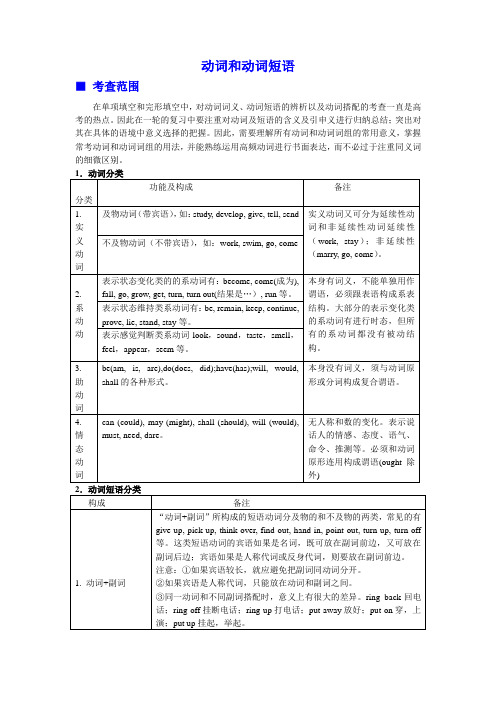
动词和动词短语■考查范围在单项填空和完形填空中,对动词词义、动词短语的辨析以及动词搭配的考查一直是高考的热点。
因此在一轮的复习中要注重对动词及短语的含义及引申义进行归纳总结;突出对其在具体的语境中意义选择的把握。
因此,需要理解所有动词和动词词组的常用意义,掌握常考动词和动词词组的用法,并能熟练运用高频动词进行书面表达,而不必过于注重同义词的细微区别。
■高频考点高考对动词的考查重点集中在实义动词的常见意义和用法,而对助动词的考查较少。
对动词短语的考查重点是第1~3项,而考查第4~6项的情况较少。
高考试题分析■真题探究1.(2010安徽)No matter how low you consider yourself, there is always someone ______you wishing they were that highA. getting rid ofB. getting along withC. Looking up toD. looking down upon【答案与解析】C getting rid of意为“摆脱;去除”;getting along with意为“与……相处;进展”;Looking up to意为“尊敬;敬仰”;looking down upon意为“看不起;轻视”。
句意为“你无论认为自己怎样低下, 总希望有个高尚的人来尊敬你。
”2. (2010全国Ⅰ)The workers ______ the glasses and marked on each box “ This Side Up”A. carriedB. deliveredC. pressedD. packed【答案与解析】D 句意:工人们把玻璃制品包装好并且每个盒子上标记上“此面向上”。
选项为四个意思上毫无关联的动词, 此题考查动词的词义辨析。
carry 译为搬运, deliver译为递送, press译为按, 压, pack译为打包。
动词与动词短语

第四讲动词和动词短语考点一动词的分类1,及物动词:可直接加宾语。
如:do, hate, like, marry, say, tell.2,不及物动词:加适当的介词后再加宾语。
如:come, go, arrive3,助动词:have (has, had),do (did, does)4,可接双宾语的动词如: show, buy, sell, offer, make, teach, award等,其用法为:1,动词+间宾(人)+直宾(物)buy me a book.2,动词+直宾+for(为)+间宾buy a book for me.3,动词+直宾+to(方向)+间宾show the book to me.5, 系动词:be (am, is, are, was, were)除be动词外,还有些动词可以用作连系动词,它们不能单独作谓语,必须与表语(多为形容词)一起构成合成谓语。
【对点演练】一. 单句语法填空,根据汉语提示完成句子。
1.You know how I ____(讨厌)math.2.He _________(进入)the room and shut the door.3.Do you ____(助动词)something to eat?4.He is saving up to buy a house ____(介词) his family.5.He ___(系动词) staying with friends this weekend.答案:1 hate 2came into 3have 4for 5is二. 单句语法改错1.Now I like to the film some.2.Will you go us? Sure!3.Love me as I love you?4.Do not expect him to show kindness for you.5.I will brain you if you don't keep quietly.答案:1去掉to 2 go后面加with 3Love前面加Do,且Love改love 4for改to 5quietly改quiet考点二动词辨析1. 重点掌握某些近义词的辨析如:admit, allow, permit; contain, include; receive, accept; want, wish, hope, expect; stay, remain, keep; discover, uncover等。
高中英语语法过关辅导课件-动词和动词词组

She went through the book before buying it. She went over the lessons for three times. He had to go without food. The ship is heading for the nearest port. He is looking up a new word in the dictionary. The boy looked through the picture book. She put up a picture on the wall. The match is put off owing to the rain. The bus ran over his legs. His illness results from overeating. Overeating results in his illness.
You will answer for what you’ve done. The boy asked for more food. He doesn’t care for playing football. I came across an old friend in the street.
call up打电话
到进一步发展,不能与名词purpose搭配使用。obtain“获得,得
到”,多指获得信息、知识、忠告、许可等,不能与purpose搭配。 reach“达到,达成”,在此最具迷惑性,但reach多与conclusion,
decision, agreement, destination等名词搭配,不能与purpose搭配。
sth.“因某事而控告某人”。blame“责备,责怪”,常与介词for
语法精讲(五) 动词及动词短语

语法精讲(五)动词及动词短语考情分析扬帆起程的导航灯近五年的江苏高考单项填空中都考查到动词及动词短语,考查的形式为动词词义辨析和动词短语的辨析,因此可把动词归为高考的重点知识。
考生对于动词及动词短语这一块知识的失分最主要的原因在于词汇量不足以及对词义辨析不清,其次就是对上下文语境理解有误。
考点聚焦疑难点津的北斗星考点1 动词的词义辨析lay与lieaccuse与charge二者皆为“指控,控告”,搭配不同,另外charge是法律上正式用语。
accuse sb. of sth.; charge sb. with sth.match, fit 与suitmatch vi. & vt. 表品质、颜色、设计等方面匹配,表示“与……相配,和……一致”。
fit vi. & vt. 多指衣物等大小合身,合适。
suit 表适合,强调衣物的颜色、式样、质地等适合某人,也指合乎需要、口味、性格、条件等。
persuade与advisepersuade 说服 persuade sb. to do sth./persuade sb. into doing sth.advise 建议 advise doing sth./advise sb. to do sth.speak,say,talk与tellspeak vi. & vt. 讲 speak English/speak well of sb./sth.say vt. 说 say sth./It says...talk vi. 谈 talk to sb. about/of sth.tell vt. 告诉;区别 tell sb. sth. /tell the truth or a lie/tell...from...wear,put on, dress 与have on都指穿衣,但have on, wear表状态;put on表动作;dress 既表状态又表动作,且不跟衣物作宾语: dress sb./oneself 或be dressed in a suitborrow,lend 与keepborrow 借进;lend借出,两者皆为短暂动词,不能与一段时间连用,表示借多久都用keep。
动词和动词词组全解

• 助动词的语法功能是协助主动词表示不同的语 法意义或情态意义,比如表示某一动作正在进 行或已经完成,应该做某事或不应该做某事。 • 英语的助动词分为三类:基本主动词、情态助 动词和半助动词。 • a)基本助动词 • 基本助动词只有3个:be, do, have。作为助动 词,be, do, have本身没有词汇意义,只在动 词词组中起语法作用。比如助动词be通常用来 协助主动词构成进行体或被动态: • I am listening to a Beethoven symphony. • The students were praised by the principal.
• c) 半助动词 • 半助动词指某些兼有主动词和助动词特征的 语法结构,比如have to, seem to之类的结构 既可与主动词搭配构成复杂动词词组并表示 情态意义,从而像是情态助动词。 • I have to buy a new car. • 又能与其他助动词搭配,像是主动词。、 You will have to sell your house. He didn't seem to love her.
• • • • • • • • •
过去进行体(past progressive): She was playing the piano this time yesterday. 现在完成体(Present perfective): She has played the piano for half an hour. 过去完成体(Past perfective): 现在进行完成体(Present perfective progressive) She has been playing the piano for a long time. 过去完成进行体(Past perfective progressive) By 10 o'clock she had been playing the piano for two hours.
【译林版】四上英语小学英语动词、词组归纳

【译林版】四上英语小学英语动词、词组归纳【译林版】四上英语小学英语动词、词组归纳动词可以说是英语中最重要的部分之一,它们用于描述动作、状态、感觉等等。
在四上的英语学习中,学生会接触到许多常用的动词和词组。
这里将梳理一些重要的动词和词组,以帮助学生更好地学习和理解英语。
一、动作动词1. go(去)I go to school by bus every day.我每天坐公交车去上学。
2. come(来)Please come to my house for dinner.请来我家吃晚饭。
3. see(看见)I can see a bird in the tree.我能在树上看见一只鸟。
4. hear(听见)Can you hear the music?你能听到音乐吗?5. listen(听)Listen to the teacher carefully.仔细听老师的讲话。
6. watch(看)I like to watch movies on the weekend.我喜欢在周末看电影。
7. play(玩、打)She likes to play with her friends after school. 她放学后喜欢和朋友们玩。
8. do(做)I have a lot of homework to do.我有很多作业要做。
9. make(制作)My mom makes delicious cookies.我妈妈做的饼干很好吃。
10. eat(吃)I usually eat breakfast at 8 o'clock.我通常在8点吃早饭。
11. drink(喝)He drinks milk every morning.他每天早上喝牛奶。
12. write(写)I can write my name in English.我会用英语写我的名字。
13. read(读)She loves to read books.她喜欢读书。
(完整版)英语常用词组大全(经典珍藏版)
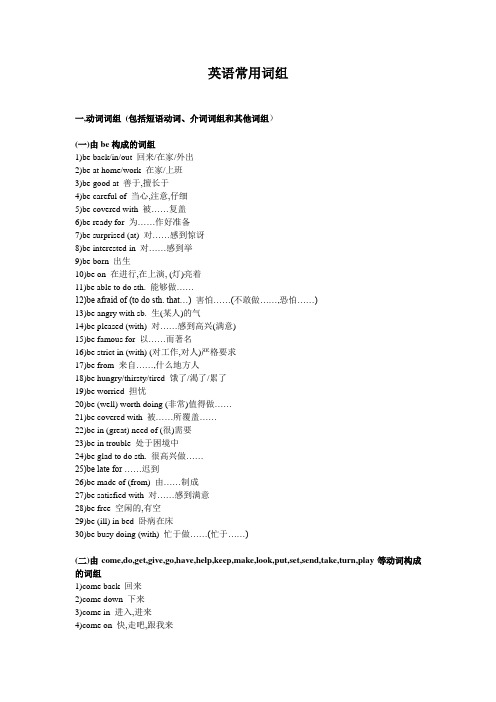
英语常用词组一,动词词组(包括短语动词、介词词组和其他词组)(一)由be构成的词组1)be back/in/out 回来/在家/外出2)be at home/work 在家/上班3)be good at 善于,擅长于4)be careful of 当心,注意,仔细5)be covered with 被……复盖6)be ready for 为……作好准备7)be surprised (at) 对……感到惊讶8)be interested in 对……感到举9)be born 出生10)be on 在进行,在上演, (灯)亮着11)be able to do sth. 能够做……12)be afraid of (to do sth. that…) 害怕……(不敢做……,恐怕……)13)be angry with sb. 生(某人)的气14)be pleased (with) 对……感到高兴(满意)15)be famous for 以……而著名16)be strict in (with) (对工作,对人)严格要求17)be from 来自……,什么地方人18)be hungry/thirsty/tired 饿了/渴了/累了19)be worried 担忧20)be (well) worth doing (非常)值得做……21)be covered with 被……所覆盖……22)be in (great) need of (很)需要23)be in trouble 处于困境中24)be glad to do sth. 很高兴做……25)be late for ……迟到26)be made of (from) 由……制成27)be satisfied with 对……感到满意28)be free 空闲的,有空29)be (ill) in bed 卧病在床30)be busy doing (with) 忙于做……(忙于……)(二)由come,do,get,give,go,have,help,keep,make,look,put,set,send,take,turn,play等动词构成的词组1)come back 回来2)come down 下来3)come in 进入,进来4)come on 快,走吧,跟我来5)come out出来6)come out of 从……出来7)come up 上来8)come from 来自……9)do one's lessons/homework 做功课/回家作业10)do more speaking/reading 多做口头练习/朗读11)do one's best 尽力12)do some shopping (cooking reading, cleaning)买东西(做饭菜,读点书,大扫除)13)do a good deed (good deeds)做一件好事(做好事)14)do morning exercises 做早操15)do eye exercises 做眼保健操16)do well in 在……某方面干得好17)get up 起身18)get everything ready 把一切都准备好19)get ready for (=be ready for) 为……作好准备20)get on (well) with 与……相处(融洽)21)get back 返回22)get rid of 除掉,去除23)get in 进入,收集24)get on/off 上/下车25)get to 到达26)get there 到达那里27)give sb. a call 给……打电话28)give a talk 作报告29)give a lecture (a piano concert)作讲座(举行钢琴音乐会)30)give back 归还,送回31)give……some advice on 给……一些忠告32)give lessons to 给……上课33)give in 屈服34)give up 放弃35)give sb. a chance 给……一次机会36)give a message to…… 给……一个口信37)go ahead 先走,向前走,去吧,干吧38)go to the cinema 看电影39)go to bed 睡觉(make the bed 整理床铺)40)go to school (college) 上学(上大学)41)go to (the) hospital 去医院看病42)go over 过一遍,复习/ go over to 朝……走去43)go fishing/skating/swimming/shopping 去钩鱼/滑冰/游泳/买东西44)go home (there) 回家去(去那儿)45)go round 顺便去,绕道走46)go up 上去47)go out for a walk 外出散步48)go on (doing) 继续(做……)49)go on with one's work 继续某人的工作50)go upstairs/downstairs 上/下楼51)(the lights) go out (灯)熄了52)have a lesson (lessons)/a meeting 上课/开会53)have a football match (basketball match) 举行一场足球(蓝球)赛54)have dictation 听见55)have a try 试一试56)have a good/wonderful time 玩得很高兴57)have a lecture (a piano concert) 听讲座(听钢琴音乐会)58)have a report (talk) on 听一个关于……的报告59)have a glass of water (a cup of tea) 喝一杯水,(一杯茶)60)have breakfast/lunch/supper 吃早饭/午饭/晚饭61)have a meal (three meals) 吃一顿饭(三餐饭)62)have a dinner 吃正餐63)have bread and milk for breakfast 早饭吃面包和牛奶64)have (have got) a headache 头痛65)have a fever 发烧66)have a cough (a cold) 咳嗽(感冒)67)have a look (at) 看一看……68)have a rest (a break) 休息一会儿(工间或课间休息)69)have a talk 谈话70)have a swim/walk 游泳/散步71)have sports 进行体育锻炼72)have a sports meet (meeting) 开运动会73)have something done 让人(请人)做……74)have a test/an exam 测验/考试75)have an idea 有了个主意76)had better do sth. (not do sth.) 最好做……(最好不要做……)77)have a word with 与……谈几句话78)help sb. with sth. help sb. do sth. 在……方面帮助…… 帮助……做79)help oneself to some chicken/fish/meat 请随便吃点鸡/鱼/肉80)help each other 互相帮助81)keep up with 跟上……,不落后于……82)keep silent/quiet 保持沉默/安静83)keep sb. doing sth. 使……一直做……84)keep one's diary 记日记85)make a noise (a lot of noise, much noise, noises)吵闹(十分嘈杂,响声)86)make a living 谋生87)make sb. do sth. 迫使某人做……88)make faces (a face)做鬼89)make friends (with)与……交朋友90)make a mistake (mistakes)犯错误91)make room/space for 给……腾出地方92)make a sentence (sentences)with 用……造句93)make a fire 生火94)be made from/of 由……制成95)be made in 在……地方制造96)look out of (outside) 往外看(看外面)97)look up a word (in the dictionary) 查字典98)look up 往上看,仰望99)look after 照管,照看,照顾100)look for 寻找101)look like 看上去像102)look fine/well/tired/worried 看起来气色好/健康/疲劳/忧虑103)look out 当心,小心104)look on …as… 把……当作……看待105)look around 朝四周看106)look at 看着……107)put on 穿上(衣服),戴上(帽子),上演(戏剧)108)put up 建造,搭起,挂起,举起,109)put into 使进入,输入110)put one's heart into 全神贯注于111)put…down… 把……放下112)put…into… 把……译成113)set up 竖起,建起114)set off 出发,动身115)set out 出发116)set an example for 为……树立榜样117)send for 派人去请(叫)118)send out 放出,发出119)end up 把……往上送,发射120)take one's advice 听从某人劝告121)take out 拿出,取出122)take down 拿下123)take place 发生124)take one's place 坐……的座位,代替某人职务125)take the place of 代替……126)take a walk/rest 散步/休息127)take it easy 别紧张128)take sth. with sb. 随身带着129)take sb. to a park/London for one's holidays 带某人去公园/伦敦度假130)take care of 关心,照顾,保管131)take a look (a last look) at 看一看(最后看一眼)132)take an exam 参加考试133)take away 拿走134)take back 收回,带回135)take hold of 抓住……136)take off 脱下(衣,帽,鞋等)拿掉137)take (an active) part in (积极)参加(活动)138)take photos 拍照139)take some medicine 服药140)take a bus/train, boat/ 乘公共汽车,火车/船141)turn on 开,旋开(电灯,收音机等)142)turn off 关上(电灯,收音机等)143)turn in 交出,上交144)turn…into… 变成145)turn to 翻到,转向146)turn down (把音量)调低147)turn…over 把……翻过来148)play basketball 打篮球,football 踢足球,volleyball 打排球149)play games 做游戏150)play the piano (the violin) 弹钢琴(拉小提琴)151)play with snow 玩雪152)play a joke (on) 对……开玩笑(三)由其他动词构成的词组153)think over 仔细考虑154)arrive at/in a place 到达某处155)eat up 吃完,吃光156)do well in 在……干得好157)enjoy doing sth. like doing sth. 喜欢做某事喜欢干某事158)find out 发现,查出(真相等)159)finish off 吃完,喝完160)stop doing sth. 停止做某事161)stop to do sth. 停下来去做某事162)hold a meting 举行会议163)hold up 举起164)hurry up 赶快,快点165)enter for 报名参加166)laugh at 嘲笑167)be used to 习惯于168)used to 过去常常169)wake…up 唤醒170)work out 算出171)sth happen to sb 某人发生某事172)sb happen to do sth 某人碰巧做某事二,动词短语,介词短语和其他词组1)ask for 向……要……,请求2)ask for leave 请假3)send for 派人去请(叫)4)pay for 付……的款5)wait for 等候6)thank for 为……感谢7)apologize to sb. for sth. 为某事向某人道歉8)look for 寻找9)leave…for 离开……去……10)fall off 跌落11)catch cold 着凉,伤风12)catch up with 赶上13)agree with sb. 赞成,同意某人的意见14)filled……with 把……装满15)tell sb. about sth. 告诉某人某事16)talk about 谈论……17)think about 考虑……18)worry about 担忧……19)look after 照料20)run after 追赶,跟在后面跑21)read after 跟……读22)smile at 对……微笑23)knock at 敲(门,窗)24)shout at 对……大喊(嚷)25)throw away 扔掉26)work hard at 努力做……27)wait in line 排队等候28)change…into… 变成29)hurry into… 匆忙进入30)run into… 跑进31)hear of 听说32)think of 认为,考虑33)catch hold of 抓住34)instead of 代替……35)hand in 交上来36)stay in bed 卧病在床37)hear from 收到……来信38)at once 立刻39)at last 最后40)at first 起先,首先41)at the age of… 在……岁时42)at the end of… 在……之末43)at the beginning of… 在……之初44)at the foot of… 在……脚下45)at the same time 同46)at night/noon 在夜里/中午47)with one's help 在某人的帮助下,由于某人的帮助48)with the help of … 在……的帮助下49)with a smile 面带笑容50)with one's own eyes 亲眼看见51)after a while 过了一会儿52)from now on 从现在起53)from then on 从那时起54)far example 例如55)far away from 远离56)from morning till night 从早到晚57)by and by 不久58)by air mail 寄航空邮件59)by ordinary mail 寄平信60)by the way 顺便说61)by the window 在窗边62)by the end of… 到……底为止63)little by little 逐渐地64)in all 总共65)in fact 事实上66)in one's twenties 在某人二十几岁时67)in a hurry 匆忙68)in the middle of 在……中间69)in no time (in a minute) 立刻,很快70)in time (on time) 及时71)in public 公众,公开地72)in order to 为了……73)in front of 在……前面74)in the sun 在阳光下75)in the end 最后,终于76)in surprise 惊奇地77)in turn 依次78)of course 当然79)a bit (of) 有一点儿80)a lot of 许多81)on one's way to 某人在去……的路上82)on foot 步行,走路83)a talk on space 一个关于太空的报告84)on the other hand 另一方面85)at/on the weekend 在周末86)on the left (right) 在左(右)边87)on the other side of 在……另一边88)on the radio 通过收音机(无线电广播)89)to one's joy 使……高兴的是90)to one's surprise 使……惊讶的是三,量词词组和其他词组(一)量词词组1)a bit 一点儿2)a few (of) 一些(可数),几个……3)a little 一些(不可数)4)a lot of (lots of) 许多5)a piece / slice of 一张(一片,块)6)a cup of 一茶怀7)a glass of 一玻璃杯8)a pile of (piles and piles of) 一堆(一堆堆的)……9)a box of 一盒10)a copy of 一份,一本11)a bowl of 一碗12)a basket of 一篮13)a plate of 一盘14)a bottle of 一瓶15)a basin of 一脸盆16)a set of 一套17)a kind of 一种18)a type of 一种类型的19)a great deal of 非常多,大量的(不可数名词)20)a large (great) number of 非常多,大量的(可数名词)21)a great many 大量,许多(可数名词)22)a different type of 一种不同型号的23)a group of 一队,一组,一群(二)其他词组1)all kinds of 各种各样的2)all over the world/the country 全世界/全国3)all over 遍及每一部分,浑身4)all one's life 一生5)one after another 顺次6)the Children's Palace 少年宫7)day after day 日复一日8)up and down 上上下下9)the day after tomorrow 后天10)the day before yesterday 前天11)the last/past two years (or so) 最近两年(左右)12)the whole country/the whole world 全国/全世界13)a moment ago 刚才14)just now/then 刚才/那15)half an hour's walk 步行半小时的路程16)late on 过后,后来常用短语动词分类归纳一,动词+介词1.agree with同意……意见;符合;一致2.ask for请求;询问3.arrive at/in到达4.begin with以……开始e from来自6.feel like想要7.fall behind落在……后面8.fall off掉下9.get to到达10.get on上(车)11.get off下来;从……下来12.hear of听说13.knock at/on敲(门,窗等)ugh at嘲笑15.look at看16.look after照看17.listen to听18.look for寻找19.quarrel with吵架20.stop...from阻止……做……21.wait for等候二,动词+副词e out出来;花开e over顺便来访;过来e along来;随同e in进来5.eat up吃光6.fall down倒下;跌倒7.find out找出;查明8.go back回去9.go on继续10.go out外出11.get back回来;取回12.grow up长大;成长13.get up起床14.go home回家15.hurry up赶快16.hold on不挂断;等一等17.look out留神;注意18.look over检查19.look up向上看;查阅20.move away搬走21.put on穿上;上演22.pass on传递23.run away逃跑24.ring up打电话25.set off出发;动身26.throw out乱丢;抛散27.turn on打开28.turn off关29.take out取出30.trip over绊倒31.turn...over把……翻过来32.write down写下;记下33.wake up醒来34.work out算出;解出三,动词+副词+介词1.be fed up with厌倦2.catch up with赶上3.go on with继续4.get on with与……相处5.pull...up from把……从……中拉出来四,动词+名词+介词1.take care of照料;照顾2.make room for给……腾出地方3.make friends with与……交朋友4.play a joke on戏弄某人5.have a look at看一看6.have a drink of喝一点7.say goodbye to告别;告辞五,动词+形容词+介词1.be late for迟到2.be angry with生气3.be busy with忙于4.be short for是……的简称5.be interested in对……感兴趣6.be famous for因……而著名7.be good at擅长8.be different from与……不同9.be good/bad for对……有益/害10.be friendly to对……友----------------------------------------------------------------------------------------------------------------------。
动词和动词短语

3 一、动词的类别
精讲
精练
动词包括四类:实义动词、情态动词、助动词、系动词, 其中 除实义动词外, 其余的几类都得和动词或其他词一起构成谓语
2. 系动词
系动词有一定的词义, 但不完整, 必须和作表语的形容词、 名词、介词短语、副词及非谓语动词一起连用。如以上3、 4小题。 系动词分为两类: 一类表示状态或存在,
精讲
精练
5. in
(2) 包围, 关闭(to be surrounded, or enclosed)
close in 包围, 封闭
lock in 禁闭
shut in 关进
wall in 围住
26/85
3 二、动词短语
精讲
精练
5. in
(3) 加入, 记入(to be added, or included)
1/85
精讲
精练
动词是英语中最重要的词汇, 是英语句子中心, 因此掌握动 词是学好英语的关键。
2/85
3 一、动词的类别
精讲
精练
动词包括四类:实义动词、情态动词、助动词、系动词, 其中除 实义动词外, 其余的几类都得和动词或其他词一起构成谓语。
1. 实义动词
实义动词又称行为动词, 是具有实实在在意义能单独作谓 语的动词。 实义动词分为及物动词和不及物动词。 及物动词后需带宾语意义才完整, 如:buy, catch, invent, like, say等。 不及物动词后不需或不能接宾语, 如:live, agree, look, listen, come, rise等。
tire / wear out 筋疲力尽
29/85
3 二、动词短语
精讲
精练
初中英语常见动词及动词词组
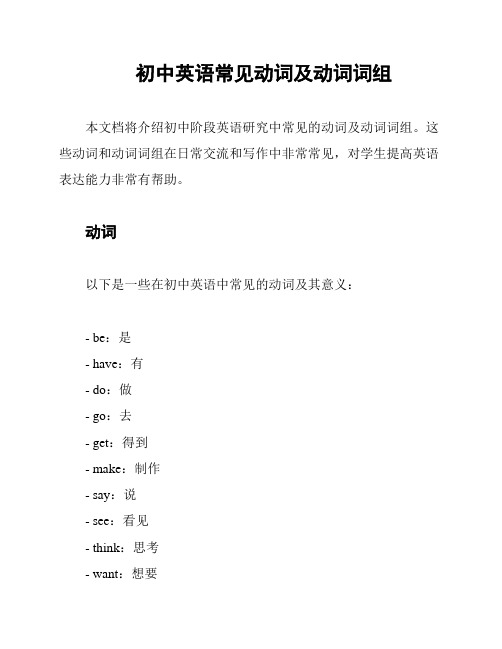
初中英语常见动词及动词词组
本文档将介绍初中阶段英语研究中常见的动词及动词词组。
这些动词和动词词组在日常交流和写作中非常常见,对学生提高英语表达能力非常有帮助。
动词
以下是一些在初中英语中常见的动词及其意义:
- be:是
- have:有
- do:做
- go:去
- get:得到
- make:制作
- say:说
- see:看见
- think:思考
- want:想要
- like:喜欢- love:爱
- enjoy:享受- study:研究- play:玩耍- eat:吃
- drink:喝
- wear:穿戴- sleep:睡觉- run:跑
- walk:走
- listen:听- speak:说话- read:阅读- write:写
- draw:画图- sing:唱歌- dance:跳舞
动词词组
以下是一些常用的初中英语动词词组:
- go to school:去上学
- get up:起床
- go to bed:去睡觉
- have breakfast:吃早餐
- have lunch:吃午餐
- have dinner:吃晚餐
- do homework:做作业
- play sports:进行体育运动
- watch TV:看电视
- listen to music:听音乐
- speak English:说英语
- read books:读书
- write essays:写作文
希望以上内容对您的英语学习有所帮助。
加油!。
动词及动词词组考点透析
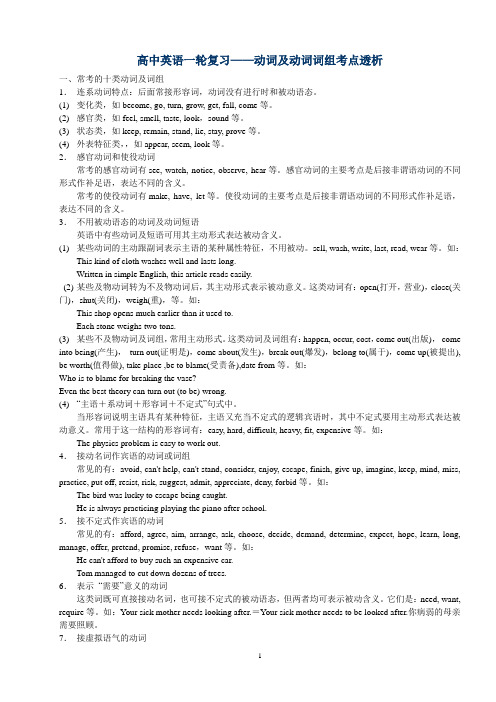
高中英语一轮复习——动词及动词词组考点透析一、常考的十类动词及词组1.连系动词特点:后面常接形容词,动词没有进行时和被动语态。
(1) 变化类,如become, go, turn, grow, get, fall, come等。
(2) 感官类,如feel, smell, taste, look,sound等。
(3) 状态类,如keep, remain, stand, lie, stay, prove等。
(4) 外表特征类,,如appear, seem, look等。
2.感官动词和使役动词常考的感官动词有see, watch, notice, observe, hear等。
感官动词的主要考点是后接非谓语动词的不同形式作补足语,表达不同的含义。
常考的使役动词有make, have, let等。
使役动词的主要考点是后接非谓语动词的不同形式作补足语,表达不同的含义。
3.不用被动语态的动词及动词短语英语中有些动词及短语可用其主动形式表达被动含义。
(1) 某些动词的主动跟副词表示主语的某种属性特征,不用被动。
sell, wash, write, last, read, wear等。
如:This kind of cloth washes well and lasts long.Written in simple English, this article reads easily.(2) 某些及物动词转为不及物动词后,其主动形式表示被动意义。
这类动词有:open(打开,营业),close(关门),shut(关闭),weigh(重),等。
如:This shop opens much earlier than it used to.Each stone weighs two tons.(3) 某些不及物动词及词组,常用主动形式。
这类动词及词组有:happen, occur, cost,come out(出版),come into being(产生),turn out(证明是),come about(发生),break out(爆发),belong to(属于),come up(被提出), be worth(值得做), take place ,be to blame(受责备),date from等。
部编人教版小学二年级语文上册动词组词大全
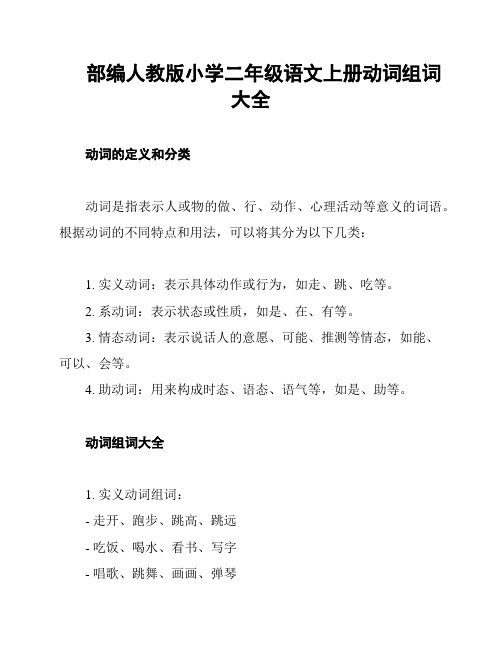
部编人教版小学二年级语文上册动词组词
大全
动词的定义和分类
动词是指表示人或物的做、行、动作、心理活动等意义的词语。
根据动词的不同特点和用法,可以将其分为以下几类:
1. 实义动词:表示具体动作或行为,如走、跳、吃等。
2. 系动词:表示状态或性质,如是、在、有等。
3. 情态动词:表示说话人的意愿、可能、推测等情态,如能、
可以、会等。
4. 助动词:用来构成时态、语态、语气等,如是、助等。
动词组词大全
1. 实义动词组词:
- 走开、跑步、跳高、跳远
- 吃饭、喝水、看书、写字
- 唱歌、跳舞、画画、弹琴
- 游泳、打篮球、踢足球、滑冰
- 穿衣、洗脸、刷牙、洗手
2. 系动词组词:
- 是的、在家、有钱、高兴
- 研究、工作、休息、玩耍
3. 情态动词组词:
- 能力、可能、可以、愿意
- 必须、要、应该、会
4. 助动词组词:
- 是的、能够、正在、已经
- 已经、曾经、一直、还是
注意:以上只是一些常见的动词组词,具体的组词方式还有很多,您可以根据需要进行创造和组合。
总结
本文介绍了部编人教版小学二年级语文上册动词组词大全。
动词可以分为实义动词、系动词、情态动词和助动词等不同类别。
实义动词适用于表示具体动作或行为,系动词表示状态或性质,情态动词表示情态,助动词用于构成时态、语态、语气等。
希望以上内容对您有所帮助。
如需更多信息,请参考相关教材或咨询相关专业人士。
动词及动词短语

动词及动词短语概述动词(verb)一般就是用来表示动作或状态的词。
动词一般在句中担任谓语的成分一实意动词:能独立做谓语的动词就是实意动词。
主要包括及物动词和不及物动词。
1.及物动词—Transitive Verb (vt)本身意义不完整,需要接宾语才能使其意义完整。
seat , injure ,accept , finish , cover, defeat, put, give, post, sell, buy ,consider, advise, hear…..例句:It is hard to change ourselves.2.不及物动词—Intransitive Verb(vi)本身意义完整,不需要接宾语,如需加宾语,通常先加介词再加宾语。
Listen, look,Come , go , arrive , sit , swim, cry, stand , run ,fail, happen, take place, break out , occur, come true,exist…改错:1)Look the blackboard! 2)I like listening music. 3)3.系动词:连接主语和表语的动词。
特点:它本身有词义,但不能单独做谓语,后面须跟表语一起构成复合谓语。
表示主语的身份(I am a teacher.),类别(It is a book),特征(She is beautiful)和状态( The door is open)等。
分三类:1)表示一个特征或状态:be , taste, look , feel , sound, seem, appearHe looks very happy. The food tastes delicious2)表示变成某种状态:make , turn , get, come , grow, run , prove , become ,turn out , goThe leaves turn yellow in autumn.It becomes colder and colder3)表示保持某种状态:keep, remain , continue, lie ,stayStaycalm when you are in danger.当你处于危险的时候保持冷静。
小学英语常见动词及动词词组

小学英语常见动词及动词词组swim游泳fly飞jump跳walk走run跑sleep睡觉drink water喝水get up起床go to bed起床go home回家go to school去上学go swimming去游泳go fishing去钓鱼go shopping买东西go hiking去远足go skiing滑雪go skating滑旱冰go ice-skating滑冰play sports做运动play ping-pong打乒乓play football踢足球play the piano弹钢琴play chess 下棋play computer games玩电脑游戏play the violin拉小提琴listen to music听音乐watch TV看电视read a book看书write a letter写信write an e-mail写邮件write a report写报告take pictures拍照片sing and dance唱歌跳舞draw pictures 画画fly kites 放风筝watch insects观察昆虫make a kite 做风筝pick up leaves摘树叶do an experiment做实验catch butterflies抓蝴蝶count insects数昆虫collect stamps收集邮票climb a mountain爬山row a boat 划船take a trip 旅游do housework做家务clean the room打扫房间cook dinner做晚饭make the bed铺床wash clothes洗衣服do the dishes洗碗sweep the floor扫地set the table放桌子answer the phone接电话water the flowers浇花empty the trash倒垃圾have a picnic野餐do homework做家庭作业eat breakfast吃早餐do morning exercises晨练have an English class上英语课plant trees种树visit grandparents看望爷爷奶奶make a snowman堆雪人ride a bike骑车。
- 1、下载文档前请自行甄别文档内容的完整性,平台不提供额外的编辑、内容补充、找答案等附加服务。
- 2、"仅部分预览"的文档,不可在线预览部分如存在完整性等问题,可反馈申请退款(可完整预览的文档不适用该条件!)。
- 3、如文档侵犯您的权益,请联系客服反馈,我们会尽快为您处理(人工客服工作时间:9:00-18:30)。
一,基本助动词
be 1. be通常用来协助主动词构成进行体和被动态 I am listening to a Beethoven symphony
The students were praised by the principle
Example 1.The fish is fresh from water.You don’t have to smell it 2.The milk is going bad.It smells 3.This dish smells delicious
3,按词汇意义分:动态动词,静态动词 一,动态动词
第10讲
动词和动词词组
动词分类(一)
1,按其在动词词组中所起的作用分:主动词和助动词
主动词: 又叫实义动词,能独立作句子谓语成分 简单动词词组 复杂动词词组 基本助动词:be,do,have
{
助动词
{
情态助动词 can,could,may,might,will,would,shall,should,need, must,dare,dared,ought to,used to
The new lamp gave us more light
2.有些及物动词在一定上下文中既要带宾语,也要带状 语
I put the book on the shelf
二,不及物动词
1.不及物动词之后不带宾语,但有些不及物动词在一定上下 文中须带状语,否则意义完全不同
Example 1.The president is speaking
补充:(4)AAB beat (5)ABA become come run
beat
beaten
became came ran
become come run
•Verb's grammatical forms: •Tense(时):it is the verb form that shows time distinction. •Aspect(体):it is the verb form that shows motion or process is in what state in a certain time. •Voice(态):it is the verb form that shows active or passive relationship between subjects and predicate verbs. •Mood(式):it is the verb form that is used to distinguish speakers in what tone of voice. •Tense(时):过去时 现在时 将来时 •Aspect(体): •Progressive Aspect进行体 •Perfective Aspect完成体
Examples: 1.I have to buy a new car. 2. You will have to sell your house.
2.按是否须跟有补足成分以及须跟什么样的补足成分分
{
及物动词 不及物动词 连系动词
一,及物动词 1. 及物动词后须带宾语,有些可带双宾语,
John is playing cricket
表示肉体感觉的动词,如ache, feel ,hurt等,用于进行体或非进行体均 可,含义不变。 Examples: 1.My foot aches/ is aching. 2.I don't feel/ am not feeling very tired.
动词分类(二)
一,单词词组和动词词组
词组动词
She doesn't hear very well. 4.表示心理或情感状态的动词,如assume, believe, consider, detest等 We understood your difficulty.
注意:
如果静态动词(stative verb)用于进行体(progressive aspect),则变为动 态动词(dynamic verb). Examples: =is acting foolishly 1.He is being foolish. =is bringing great injury to us 2.This mistake is costing us dearly. 3.Be quiet. I'm thinking. =giving thought to a problem
(2)AAA cast cast cast hit hit hit put put put set set set spread spread spread 此外还有cut,fit,hurt,let,read,cost,shut等
(3)ABB bend bent bent creep crept crept deal dealt dealt flee fled fled mean meant meant dig,catch,hang,hold,find,sit,pay,win,meet,feel等同此用法
表持续动作的词 例:drink, eat, fly, play,rain,read,run,sit等 表改变或移动的词 例:arrive, become, change, come,get,go,leave 表短暂动作的词 例:hit, jump, kick, open, close,put,shut,knock等
二,限定动词和非限定动词
{
限定动词
限定形式
非限定动词
非限定形式
{ {
现在时 过去时 不定式 现在分词 过去分词
三,规则动词和不规则动词 大多数动词的过去时和过去分词都是在原形之后加词尾-ed构 成,这类动词叫规则动词,其他则归为不规则动词 不规则动词的几种类型: (1)ABC(即原形,过去时,过去分词) arise arose arisen break broke broken ring ran run steal stole stolen begin began begun
半助动词:have to,seem to,be about to,be due to, be going to ,be meant to,be meant to,be supposed to等.
Examples: 1.The workers received a raise last year.
2.They have been taking music lessons.
{
Examples:
1.He works at a chemical factory.
表持续动作 表持续动作 表改变 表短暂动作
2.They were talking about the house.
3.Winter is here. The leaves of the trees are turning yellow. 4.The old man stops at a house and knocks at the door.
do 1. do通常用来协助主动词表示否定意义或构成疑问句 My wife doesn’t know Russian Do you agree with me?
2.do用来加强语气,起强调作用
You do look well 3.do用作代词
---Do you like Beijing?
---Yes,I do (do代替like Beijing) 4.构成否定祈使句时,只用do,而不用does 和did Don’t be so absent-minded
二,静态动词 1.用作主动词的be和have(作“有”解): We have friends all over the world. 2.含有静态动词be,have意义的动词,如apply to, belong to, differ from, cost, weigh等。
This rule applies to (=is applicable to)everyone. 3.表示感觉的动词, 如feel, hear, see, smell等
5.do用作实义动词,译为“做”
Jane was doing the dishes when her mother came back
have
1.have通常用来协调主动词构成完成体或完成进行体 Joan has seen that movie I have been working here for 20 years
Examples: 1.He couldn't account for his long absence from school. 2.The place blow up when it was hit by a missile. 3.I don't want to come down with the flu again.
•Examples:
•I speak Chinese, but now I am speaking English.
•2.I have taught English for 20 years.
•Voice(语态):
{
•Active Voice主动态•→Active Sentence主动句
2.Frank cheats at poker
三,连系动词
1.连系动词之后带主语补语
Example
1.That sound like a good idea
2.The fish smells awful
补充:(1)状态系动词:be (2)持续系动词:keep,remain,stay,rest,lie,stand等 (3)表象系动词:seem,appear,look等 (4)感官系动词:fell,smell,sound,taste等 (5)变化系动词:become,grow,turn,fall,get,go, come,run 等 (6)终止系动词:prove,turn out等 注意:有一些动词具有跨类现象,既能作及物动词,也能作不及物 动词和联系动词,常见的有smell,become,prove,taste,stay
